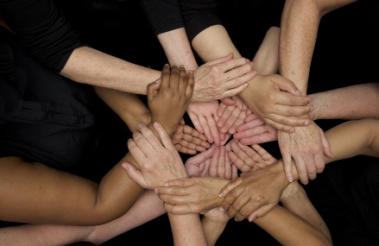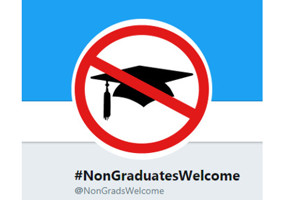The sector Twitterati outrage at Karl Wilding’s appointment as the next CEO of NCVO, our national umbrella organisation, started out focused on him being male and white, against the hopes of many that it would be a woman or someone visibly not white. Speculation about the process followed before finally settling on a line that acknowledges that Karl is good at his job, has a dedication to the sector, and is likely to do well in his new role but that somehow the process needed something more to get a different outcome.
Very few of us were involved with the process and it is unfair to criticise what we do not know.
What we do know is that NCVO engaged Green Park, the agency that wrote the report on diversity in the sector. We know that hundreds of applicants were considered and that the by dint of unexpected circumstances the diversity of the final interview panel ended up being whiter than intended.
I trust that diversity had been considered early on and throughout the process. I also trust that a level of diversity was achieved in appointing Karl as a white man from a working class background with an eye to ensuring the playing field is levelled for his mixed heritage sons.
Quick to judge
Optics are important, though. We make judgements about people and situations quickly and long after this current excitement has died down someone will still roll their eyes and make assumptions about Karl based on how he looks because his looks do afford him a level of privilege that is not given to women, BAME people, those with visible disabilities, some from the LGBTQI communities and some from particular religious backgrounds.
Society, and particularly the workplace, has different expectations of mothers than it does of fathers. There are other protected characteristics but outrage isn’t one of them.
What has been interesting is the level of outrage from white people. We do need white allies, including straight white men, but, with a notable exception, my feeling of being silenced in this discussion has been echoed privately by others.
We became complacent
The sector that I love and have worked for and with for 30 years has reached a point where it is uncomfortable that it has not achieved the level of equality it has campaigned for in other sectors. Our saviour complex has left us in need of saving from ourselves.
I believe this is because we became complacent with the relatively small successes in the ‘90s and early 2000s. We stopped running equal opportunities training and capturing the equality monitoring in a belief that everyone thought like us now and our goodness was enough to ensure that we would all overcome our inherent bias and make decisions based on merit.
The problem is that the metric for merit is based on being a well-educated, confident white male able to abrogate his parental responsibilities to a willing partner or expensive childcare. We discount and ‘other’ difference instead of celebrating and embracing it.
In many ways the world of work has evolved since I entered full time work in 1982. Back then I was faced with employers turning me away at the door with a polite, but firm, assertion that the job had gone in the hours between them hearing me on the phone and inviting me to come in for an interview.
Or, the agencies that told me they would never be able to place me as their clients only wanted English roses. In other ways I suspect it hasn’t and there are women who find their job has been restructured out when on maternity, as I did in 1992. Or, as recently described to me, the person with the East End accent being patted on the head for doing a good job as though it is unexpected of one from lowly beginnings.
Ticking boxes
I can tick four (and a half) of the protected characteristics boxes. I can add important diversity unprotected characteristics as I am from a poor, migrant, working class stock and I do not have a degree. I have over 30 years management experience, 25 years leadership experience and lived experience on a number of issues. Yet, my lack of a degree means that I cannot apply for most jobs in the sector and I have had more rejections every year of the last 10 years than I had in all of the 26 years before.
That doesn’t stop some agencies from contacting me about senior posts. I look at the roles and can see that I do not meet some of the essential criteria and tell the agency that I am not interested. It is bad enough being rejected for jobs but absolutely galling to get a rejection email for a job I actively didn’t apply for. I believe that those agencies have contacted me to help tick some of their boxes. The rejection indicates that I am sitting on their stats to clients in the diversity column.
This is now so common that I will not apply for jobs if they are through two agencies. I have to believe that I am being seen for genuine reasons of experience and merit where I have been shortlisted, not as I was for one role at the turn of the century where I found out by accident, after a very long process, that I was on the list as the diversity candidate as a cover for the already decided internal candidate’s appointment.
Six steps to bring about changes in thinking and behaviour
If John Lewis and Partners can make the change by appointing Sharon White as their chair (albeit they still refer to her as the chairman) then we should be able to change. The more examples of the intersectionality of equality and diversity characteristics we have at board and senior levels the better the chances we have of achieving equity and inclusion. This means changing our thinking and behaviour.
That first change is to accept diversity of thought, particularly at board level. Getting the visible diversity but with people who all think in similar ways or have a similar education and class background is not diversity. Boards that recruit only for patronage and access to the little black books will always prevent the achievement of equity and inclusion because the values metric will be set at their default.
The second is to walk the talk: if you espouse that others should be given a chance then you are failing to live up to that if you do not step aside and offer your place to that other. This can be achieved by helping to build their network, taking them along to events and recommending them to take your place on a working group or panel.
This links to the third: pay it forward. We will all have benefited at some point by someone giving us an opportunity. White men may not notice that they were given an opportunity as they may have been brought up to believe that is their right (please note I say may – see above about intersectionality and other characteristics). Give someone that chance. When Peter Lewis asked me if I knew anyone who could chair their EDI panel my first thought wasn’t that it should be me but that this is an opportunity for someone else to do something I have done in the past. I am proud of the small part I have played in the IoF’s Change Collective.
The fourth is a return to training. Not just unconscious bias training but practical and applicable skills training for boards and managers on recruitment. I have been thinking about how to introduce mock interviews to get panels and applicants ready to see beyond the polished through to the skills and abilities needed to do the job. I believe the sector does have diversity but it lives in the small organisations, in the diverse causes that grassroots activists and passionate volunteers work on because they haven’t found what they were looking for from the bigger, professional sector. This talent, passion and skill isn’t as valued and those groups rarely get the invitations to the tables where they can begin to influence change.
The fifth is a very simple one: remove the requirement for a degree as an entry point unless it is genuinely essential. I can see that some charities need scientists and economists. Not many really need a degree in fine arts or geography. This very simple step opens up your jobs to people who went to college or, like me, had to work as soon as they left school. You recruit for a set of skills, some knowledge and some experience. Each organisation, basically, teaches everyone who joins them their way of doing things so why are you trying to find someone who does it your particular way from the open market?
The sixth requires you to be bold and say no to appealing male candidates who ask for higher salaries than you have advertised because they believe they will transform your organisation. This creates an immediate gender pay gap. I have done a lot of recruitment over the last 30 years and there is a definite pattern that it is men who apply in this way. I am not saying that there shouldn’t be some flexibility but it is ridiculous to set a budget and then immediately decide to inflate it by 15-25 per cent because someone looks appealing. If they are genuinely the right person for the role they will be able to show their worth and generate the income to pay for that salary. Give it to them then, not at the start when they are still unproven in a new role.
This has been a long rant. I apologise for the length but not the rant – I’ve been holding it in for quite a while.
Elizabeth Balgobin is an independent charity and not for profit sector consultant
|
Related articles











